

Citizenship. Citizenship is the status of a person recognised under the custom or law of a state that bestows on that person (called a citizen) the rights and the duties of citizenship.
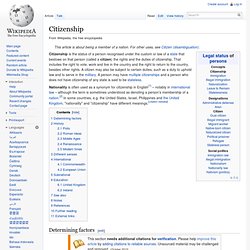
That includes the right to vote, work and live in the country and the right to return to the country, besides other rights. A citizen may also be subject to certain duties, such as a duty to uphold law and to serve in the military. A person may have multiple citizenships and a person who does not have citizenship of any state is said to be stateless. Nationality is often used as a synonym for citizenship in English[1] – notably in international law – although the term is sometimes understood as denoting a person's membership of a nation.[2] In some countries, e.g. the United States, Israel, Philippines and the United Kingdom, "nationality" and "citizenship" have different meanings. [citation needed] Determining factors[edit] A person can be a citizen for several reasons.
Marriage to a citizen (jure matrimonii). Untitled. 1985 - BILL C-31 - MAJOR AMENDMENT TO INDIAN ACT The enfranchisement provisions and changes the registration system in the Indian Act is repealed so that entitlement was no longer based on sexually discriminatory rules.
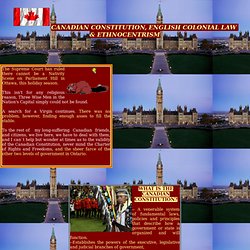
Among other things, Bill C-31, treats men and women equally; treats children equally whether born in or out of wedlock and whether they are natural or adopted; prevents anyone from gaining or losing status through marriage. Important changes were made to Canada's Indian Act on June 28, 1985, when Parliament passed Bill C-31, an Act to Amend the Indian Act. Bill C-31 brought the Act into line with the provisions of the Canadian Charter of Rights and Freedoms. -- Removal of discrimination. -- Restoring status and membership rights; and increasing control of Indian bands over their own affairs. -- C-31 changed the registration system so that entitlement was no longer based on sexually discriminatory rules. -- Treat men and women equally.
Constitution of Canada. The composition of the Constitution of Canada is defined in subsection 52(2) of the Constitution Act, 1982 as consisting of the Canada Act 1982 (including the Constitution Act, 1982), all acts and orders referred to in the schedule (including the Constitution Act, 1867, formerly The British North America Act, 1867), and any amendments to these documents.
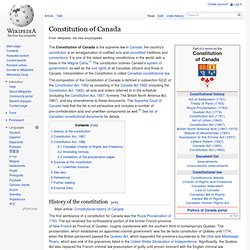
The Supreme Court of Canada held that the list is not exhaustive and includes a number of pre-confederation acts and unwritten components as well.[2] See list of Canadian constitutional documents for details. Constitutional Documents. Public law. Public law (lat. ius publicum) is that part of law which governs relationships between individuals and the government, and those relationships between individuals which are of direct concern to the society.[1] Public law comprises constitutional law, administrative law, tax law and criminal law,[1] as well as all procedural law.
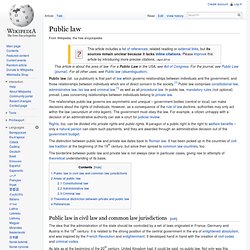
In public law, mandatory rules (not optional) prevail. Laws concerning relationships between individuals belong to private law. The relationships public law governs are asymmetric and unequal – government bodies (central or local) can make decisions about the rights of individuals. Private law. Difference Between Public and Private Law. Public vs Private Law Legal terms may appear complicated to common individuals, which is why confusion usually occurs during legal procedures.
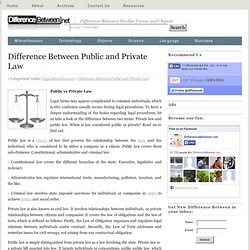
To have a deeper understanding of the basics regarding legal procedures, let us take a look at the difference between two terms: Private law and public law. Civil vs. Criminal Law. Civil law Law based upon a published code of statutes, as opposed to law found in the decisions of courts.

Body of law that determines private rights and liabilities, as distinguished from criminal law. criminal law Branch of the that specifies what conduct constitutes crime and establishes appropriate punishments for such conduct. litigation A legal action; a lawsuit. plaintiff A person who brings a lawsuit. defendant The person against whom an action is brought. civil procedure The rules of procedure by which private rights are enforced; the rules by which civil actions are governed. criminal procedure The rules of procedures by which criminal prosecutions are governed.